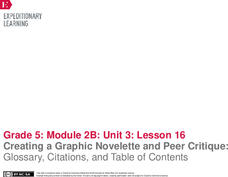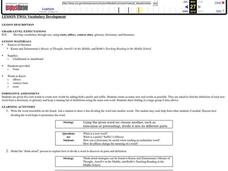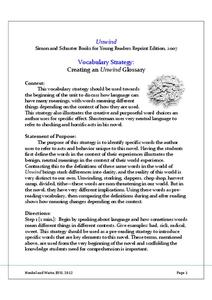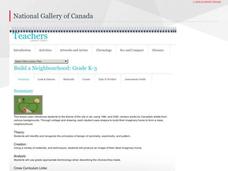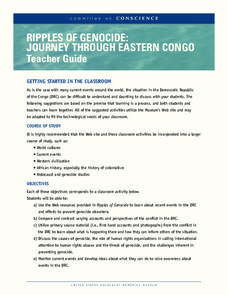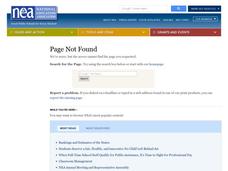EngageNY
Creating a Graphic Novelette and Peer Critique: Glossary, Citations, and Table of Contents
A, B, C ... let's alphabetize to get organized! Using the informative resource, scholars create an alphabetized glossary of key words for their graphic novelettes. Additionally, they create a table of contents and citations page.
Curated OER
Identifying Text Features of a Self-Written Fable
Make learning the parts of a book fun by having pupils construct their own glossary entries, table of contents, and title page. Beginning with a review of text features and a hunt for examples, kids use previously written fables to...
Curated OER
Tax Jeopardy
Create a glossary of tax-related vocabulary and clip New York Times articles that present tax procedure in action, in preparation for participating in a tax quiz bowl. Young economists explore allegations that "Survivor" Richard Hatch...
Curated OER
Native American Glossary
Students develop a glossary of English language words with Native American origins. They discuss a list of words, look up the words in a dictionary, and compile the definitions in alphabetical order in a class glossary.
Curated OER
Create the Ideal City
Middle schoolers examine the significance of city planning. They analyze maps, develop a crossword puzzle using vocabulary terms, and create a diagram of an ideal city and describe the features that make it healthy for the economy, the...
Curated OER
Vocabulary Development
What is a root word? What is a prefix? Suffix? Use these questions to spark a discussion amongst your language art learners. Then, start by writing the word irresistible on the board and have teams of learners attempt to create new words...
Curated OER
Unwind: Vocabulary Strategy, Creating an Unwind Glossary
Prior to reading Unwind, Neal Shusterman's 2007 young adult science fiction novel, class members research the common definition of words drawn from the novel that will come to have a very different meaning to them as they are drawn into...
National Gallery of Canada
Make a Parfleche
Examine American Indian art and culture by observing contemporary art and creating original pieces. Class members discuss artwork included in the plan and use these images to help inspire their own work, which should represent their...
National Gallery of Canada
Build a Neighbourhood
What's special about your neighborhood? Build one with your class to find out. Individuals create their dream homes that, when completed, will be placed together around a green space in order to create a neighborhood. Learners also...
Curated OER
A Gallery of Mexican Art
Students tour a virtual gallery of Mexican Art and create a glossary of art terms. They explore the history and culture of Mexico through studying Mexican art. They access websites imbedded in this plan to study the artwork.
US Holocaust Museum
Ripples of Genocide: Journey through Eastern Congo
Could you locate the Democratic Republic of Congo on a map? Scholars investigate the genocide taking place in Eastern Congo. Groups explore web-based evidence as well as the Ripples in Genocide source to take a closer look at the issue....
Overcoming Obstacles
Defining Goals
Having goals is important. The opening, two-day lesson in the Goal Setting module teaches middle schoolers the importance of setting meaningful, realistic goals. Through a series of activities, participants practice setting personal...
Curated OER
Spanish in English
What do the words alligator, armadillo, and cockroach all have in common? Each one is an English word with Spanish origins. Introduce young etymologists to the joys of discovering word origins with a lesson that asks them to create a...
EngageNY
Reading an Interview: “Sloth Canopy Researcher: Bryson Voirin”
It's time to slow down and learn about sloths! Scholars read the first few questions of an interview with a sloth canopy researcher, looking for the gist. Next, they create a glossary in the back of their journals to add new scientific...
Curated OER
The Body Talks
Young historians examine the gestures of human subjects represented in Mannerist, Baroque and Renaissance paintings. After they play charades and attempt to match dialogue with body language, learners create a drawing that includes...
Curated OER
Reference Skills
Students participate in an online scavenger hunt using the parts of a book to locate information. In this reference materials lesson, students locate the title, subtitle, table of contents and glossary. Students then create their own...
Scholastic
Lesson One: The Earth, Background and Glossary
How much do you really know about our planet? Middle schoolers build up their prior knowledge about Earth, its placement in the solar system, its composition, and important geological vocabulary with an introductory earth science lesson.
Curated OER
Vocabulary Development
Students create new words. In this vocabulary development lesson students use five root words and add a prefix and a suffix to make new words. They use the new words in a sentence.
Curated OER
Stem Cell Research Policy Lesson Plan: Create an Advocacy Brochure
Students after researching the science and the controversy around stem cell research, students create brochures to display their knowledge and a point of view.
Curated OER
Phineas Gage: Notecard Vocabulary Strategy
Understanding the vocabulary in a text, especially a text like Phineas Gage: A Gruesome but True Story About Brain Science that includes quite a few technical terms, can be the key to understanding the text as a whole. Learners focus on...
Foundation for Water & Energy Education
How Can Work Be Done with Water Power? Activity B
In this second of three activities, energy engineers plan and create a hydropower dam as they learn how hydroelectric power plants generate electricity. A hydropower puzzle is also included, which can be worked on by teams that finish...
National Gallery of Canada
The Roots of My Family
Represent family history visually by requiring your young artists to create family trees that express balance and symmetry. Pupils examine works of art, research their family histories, and put together large family tree posters.
National Gallery of Canada
Tantalizing Tessellations!
Examine repeating and intricate patterns with a study of M.C. Escher and a related art activity. Pupils view and discuss the artwork before creating their own tessellating patterns. Step-by-step instructions for creating a template are...
Social Media Toolbox
Social Media Survey
Survey says ... social media is here to stay! How do the pupils in your school use social media? Using lesson four from a 16-part series, The Social Media Toolbox, learners study surveys and create their own. The resource includes...


